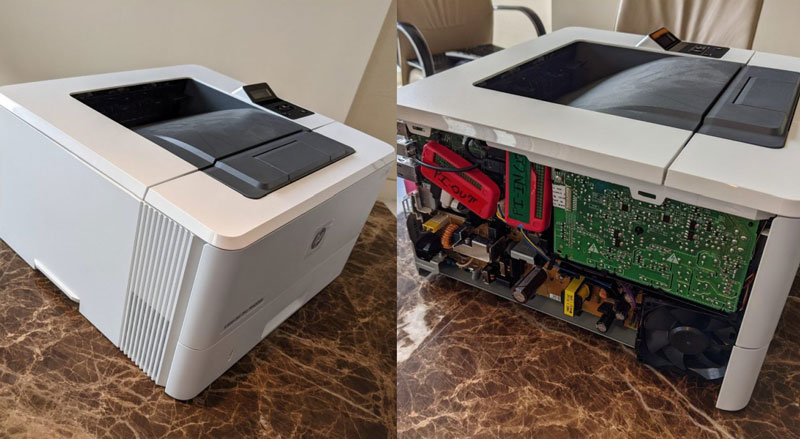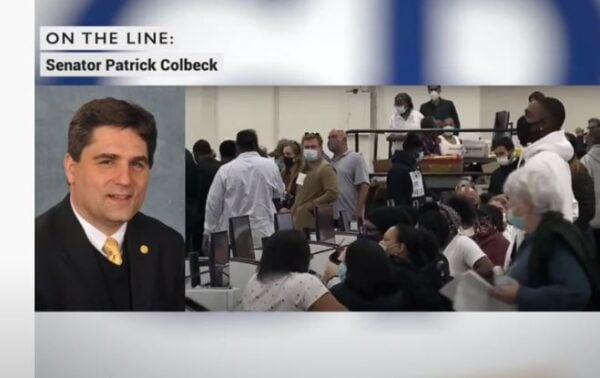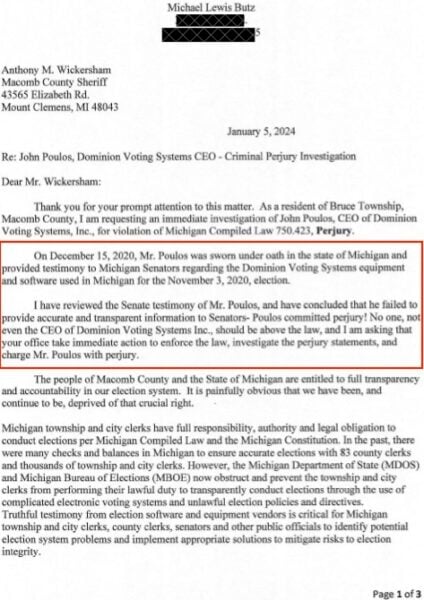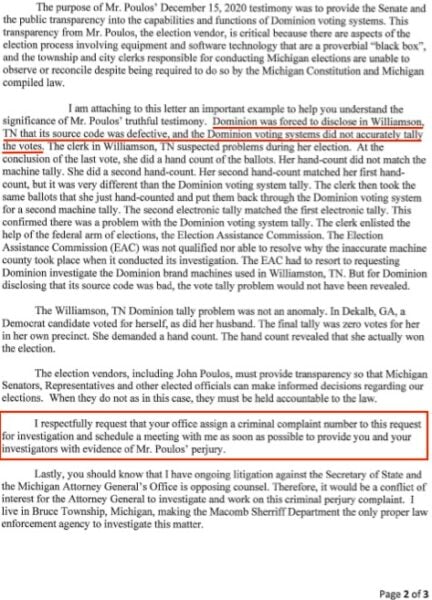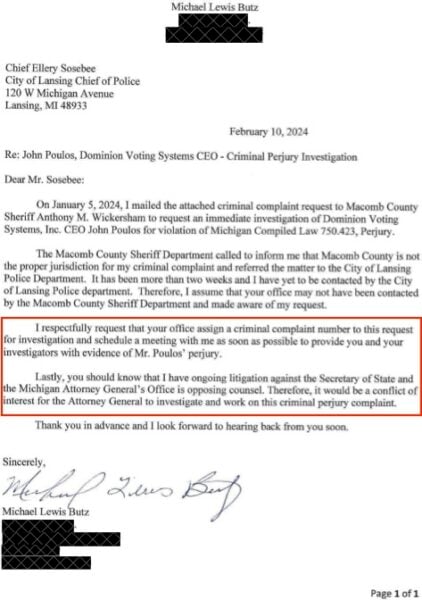GAME ON! Former MI Senator Files Perjury Criminal Complaint Against Dominion Voting Machines CEO
By
Patty McMurray Apr. 18, 2024 6:00 pm
Link:
https://www.thegatewaypundit.com/20...s-perjury-criminal-complaint/?utm_source=rss/
[see vids at site link, above]
Former MI Senator Patrick Colbeck is one of the smartest and kindest individuals I have ever had the pleasure of knowing. When speaking with Patrick, it’s easy to see why so many people in Michigan and across the nation respect and trust him. Having been involved in politics for over 15 years, I’ve met a lot of people who puff out their chests and talk about what needs to be done to save our elections from being corrupted by people with bad intentions—Patrick Colbeck isn’t one of those people. He doesn’t boast about his tireless efforts to protect our elections; instead, Patrick humbly puts his head down and goes to work, assessing potential vulnerabilities in our elections and identifying ways to correct them. Unfortunately, because Patrick Colbeck dared to question the integrity of the voting machines in 2020, which most Americans have trusted since they were first used in Michigan elections, he has become the target of Democrats and their allies in the leftist media. Patrick is also the author of
“The 2020 Coup—What Happened and What We Can Do.”
Yesterday, Senator Patrick Colbeck held a press conference outside of the MI State Capitol flanked by six of the bravest lawmakers in the state, where he announced the filing of criminal complaints against Dominion Voting Systems CEO John Poulos.
The complaint, filed by Patrick Colbeck, alleges Mr. Poulos committed 15 counts of perjury during his testimony before the MI Senate Oversight Committee on December 15, 2020.
As Central Banks Stockpile Gold, a Christian Company Works To Help Americans Get Ahead of the “Retirement Bubble”
Dominion CEO John Poulos
The video below shows Mr. Poulos being sworn in before his testimony before the MI Senate Oversight Committee.
The complaints were filed with Michigan’s Democrat Attorney General Dana Nessel, MI Secretary of the Senate Jocelyn Benson, and the MI State Police. Michigan State Representatives Jim DeSana, Steve Carra, Neil Friske, Josh Schriver, Matt Maddock, and Joe Fox, all members of the MI House Freedom Caucus, supported Patrick as he made the announcement.
Watch: [ck site link, above, top]
You can read the full complaint
HERE.
In his press release, Patrick Colbeck announces 15 COUNTS OF PERJURY that were FILED IN CRIMINAL COMPLAINT AGAINST DOMINION VOTING
Colbeck continues, “Michigan legislators and concerned citizens have brought forth allegations against John Poulos, CEO of Dominion Voting Systems, relating to his testimony under oath on December 15, 2020, before the Michigan Senate Oversight Committee. Mr. Poulos faces 15 counts of perjury based on these allegations. The testimony in question was referenced extensively in the Michigan Senate Oversight Committee’s June 2021 Report on The November 2020 Election in Michigan. The forthcoming evidence challenges the accuracy of Mr. Poulos’s statements and, by extension, questions the findings of the Senate report, which stated there was no evidence of widespread or systemic fraud in the 2020 election in Michigan.”
“The implications of the alleged misinformation are significant, potentially affecting the perceived integrity of Michigan’s electoral process and the legal repercussions faced by individuals as a result of the contested testimony. A formal complaint, accompanied by supporting evidence, is scheduled to be filed with the Michigan Secretary of the Senate, the Michigan Attorney General, and the Michigan State Police. The complaint aims to address the alleged deliberate nature of the false testimony and seeks to uphold the principles of justice,” Patrick Colbeck claims.
On his Let’s Fix Stuff website, readers can
donate to help Patrick continue his work or
subscribe to his website to stay current on the latest election integrity news.
On February 14, The Gateway Pundit wrote about a BOMBSHELL RECORDING that captured MI Prosecutor Peter Lucido accusing Dominion Voting Machines President John Poulos of perjuring himself under oath when asked about Dominion Machine’s access to the internet.
On December 15, 2020, the CEO of Dominion Voting Systems, John Poulos, testified before the MI Senate Oversight Committee in a hearing where he was asked about the Dominion Voting machines used in Michigan in the November 2020 election.
The Chair of the Senate Oversight Committee, MI Senator Ed McBroom, was first to speak with Mr. Poulos and immediately asked if the Dominion Voting Machines were connected to the internet. In his response, Mr. Poulos explained that the voting machine is “designed” to be connected to the tabulator. Senator McBroom asked if, for some reason, “the locals were to have that computer connected to the world wide web and also networked to the tabulator, is there something in the software that would it shut things down at that point—would it continue to operate? What is the security protocol at that point?” Mr. Poulos appeared to point to the “locals” as the responsible parties for determining if the machines were indeed connected to the internet. “First and foremost,” he began, “the complete security that is under the control of the local authorities is paramount.” If this is indeed true, it would appear that he’s saying it’s up to the election officials in each polling place to ensure the security of the voting machines. The response by the Dominion Voting Machines president begs the question—What if, hypothetically, of course, there were “locals” like the hostile workers at the TCF Center in 2020 who, based on their actions on the day after the 2020 election, had a strong interest in Joe Biden coming from behind to win the election in 2020? And what if there were individuals overseeing the elections who were not interested in protecting the security of the machines?
Watch: [ck site link, above, top]
Dominion President Poulos Assures Voting Machine Security is Fully Managed by Election Officials
Then-MI Senator Pete Lucido (R) asked Mr. Poulos, “How do I know, as a voter, Mr. Poulos, that I didn’t have any irregularity of the software being manipulated? How can I be sure of that?” The Dominion CEO responded by saying a “hand count audit and recount” would resolve any questions about the integrity of the machines.

MI Senator Pete Lucido (R) began his questioning of Mr. Poulos by asking if Dominion has any way to access any of the equipment on their machines remotely. The Dominion president responded by saying, “No.” Senator Lucido pressed the Dominion president, asking about the purpose of the USB port on the machines. Mr. Poulos asked for clarification about the type of machine Senator Lucido was referring to. When Senator Lucido clarified that he was speaking about the touchscreen voting machines, the Dominion president responded by saying, “Yes, there is,” adding that the touchscreen voting machines “are just an expensive fancy pen.” Mr. Poulos clarified that the “electronic pen” does not tabulate votes.
Senator Pete Lucido questions Dominion Voting Machines President John Poulos
Only two weeks ago, during an elections security trial in a federal courthouse in Georgia, computer scientist and University of Michigan professor Alex Halderman revealed shocking election machine security vulnerabilities when he demonstrated how easily a voting machine could be tampered with. Using everyday items, which included a Bic pen and a $10 smart card.
All he needed was a pen to reach a button inside the touchscreen, a fake $10 voter card he had programmed, or a $100 USB device that he plugged into a cord connected to a printer, rewriting the touchscreen’s code.
Professor Halderman’s stunning real-time example of how easily voting machines can be manipulated raised questions about the reliability of Dominion’s voting equipment that has been used in Georgia’s elections.
Trending: FBI WARNING: Chinese Hackers Preparing to Launch Massive Attack on U.S. Infrastructure – Have Already Infiltrated Several Critical Companies
In another exchange on December 15, 2020, during the MI Senate Oversight Committee hearing, Rep. MacDonald asked Dominion President Poulos, “Is it possible for a record value either locally or remotely? Mr. Poulos responded, “No, to my knowledge, it’s not.” He explained, “Even if it were, they certainly wouldn’t be able to do it undetected.” He added that “It would leave a trail” and that “several checks and balances within the machine could detect whether or not such a thing happened. Mr. Poulos concluded his response with, “Which, of course, I don’t think it can.” You don’t
think it can? How is this an acceptable answer?
When asked by Senator MacDonald if it’s possible that votes could be manipulated by inserting a USB drive into the Dominion tabulators? Mr. Poulos responded, “No, I don’t think so,” adding, “Even if it was, it would be detected.” Detected by whom, and what, exactly did Mr. Poulos mean when he said he didn’t think so? Unfortunately, Mr. Poulos wasn’t pressed on his vague response and asked to guarantee it couldn’t happen.
In early December 2023, Attorney Michael J Smith called Macomb Prosecutor Peter Lucido’s office to request a meeting with his office because his client, Michael Lewis Butz, was making a perjury criminal complaint to Macomb County Sheriff Wickersham.
On December 9, 2023, Macomb County Prosecutor Pete Lucido contacted Michael J. Smith via phone. When Smith didn’t answer, Mr. Lucido left the following message:
Mike—Pete Lucido. I got your message.
When I was in the Senate, on the Oversight Committee, we did Dominion. It was published and recorded, and it should be online.
The president of Dominion testified, and so did his engineer or software maker, and the questions were centered around whether or not there was access to the internet on these machines that Dominion made. He said no, and it was a lie!”
The January 5, 2024, complaint to Sheriff Wickersham can be seen below.
In his complaint to the Macomb County Sheriff, Michael Butz explained how, in his opinion, MI SOS Jocelyn Benson’s office and the Bureau of Elections under the direction of Jonathan Brater (who is also the chair of ERIC that is under contract with the state of MI to “clean up” Michigan’s dirty voter rolls), “
obstruct and prevent the township and city clerks from performing their lawful duty to transparently conduct elections through the use of complicated electronic voting systems and unlawful election policies and directives.”
In addition to demanding full transparency in Michigan’s elections, Smith wrote:
Truthful testimony from election software and equipment vendors is critical for Michigan township and city clerks, county clerks, senators and other public officials to identify potential election system problems and implement appropriate solutions to mitigate risks to election integrity.
Mr. Butz demanded an investigation into the crime of perjury related to Mr. Poulos’s testimony while he was under oath.
“I have reviewed the Senate testimony of Mr. Poulos and have concluded that he failed to provide accurate and transparent information to Senators- Poulos committed perjury! No one, not even the CEO of Dominion Voting Systems Inc., should be above the law, and I am asking that your office take immediate action to enforce the law, investigate the perjury statements, and charge Mr. Poulos with perjury,” Mr. Butz wrote.
On page 2 of Mr. Butz’s letter to Sheriff Wickersham, he shared an example of how important it is for law enforcement to understand the significance of Mr. Poulos’s testimony.
He wrote, “Dominion was forced to disclose in Williamson, TN, that its source code was defective and the Dominion voting systems did not accurately tally the votes.”
Mr. Poulos testified under oath in front of the Senate Oversight Committee in Lansing, MI, which is located in Ingham County, and former Senator Pete Lucido is now the prosecutor in Macomb County, making it impossible for Mr. Lucido since the alleged perjury took place outside of his district. Additionally, Macomb County Prosecutor Pete Lucido could be considered a witness. The request for an investigation into alleged perjury by Dominion President John Poulos was, therefore, sent to Lansing Chief of Police Ellery Sosebee for investigation.
In his letter to the City of Lansing Police Chief Ellery Sosebee, Mr. Butz stated that he was asking for the Lansing Police Department to assign a criminal complaint number to his request for an investigation. He explained that he initially filed the complaint in Macomb County but was told he needed to file the criminal complaint in the proper jurisdiction. Mr. Butz also explained that because he was involved in litigation against SOS Jocelyn Benson and AG Dana Nessel in another matter, he believes it would be a conflict of interest for the Lansing Police Department to turn the case over to MI AG Nessel’s office.
Does Mr. Butz have a case against Mr. Poulos? Was the Dominion Voting Machines president telling the truth in his testimony to the MI State Senate Oversight Committee?
So, was the testimony of Mr. Poulos on December 15, 2020, accurate? According to the message Macomb Prosecutor Pete Lucido left for Mr. Butz, he certainly doesn’t believe Mr Poulos was telling the truth while testifying under oath. Is Mr. Butz correct? Should there be an investigation into the vulnerability of all voting machines before the critical 2024 election in Michigan and in every state where they will be used?
Attorney Stefanie Lambert has sent a letter to Rep. Jim Jordan asking for the House Judiciary Committee to “immediately subpoena John Poulos, Eric Coomer (formerly employed by Dominion), and former Senator Pete Lucido to testify in front of his committee. In her letter, Lambert cites the criminal complaint filed by her client, Michael Butz, that has not yet been acknowledged by the Lansing Police Chief. In her letter, Lambert states that Macomb County Prosecutor Pete Lucido is willing to testify that Dominion CEO John Poulos lied under oath on December 15, 2020.
Less than one month after the Dominion president’s December 15, 2020, testimony, a scathing report based on expert testimony and reported by
NBC News revealed how vulnerable our elections are as long as modems installed in voting machines are allowed to connect to the internet, even briefly – According to a team of 10 independent cybersecurity experts who specialize in voting systems and elections. While the voting machines themselves are not designed to be online, the larger voting systems in many states end up there, putting the voting process at risk.
That team of election security experts says that last summer, they discovered some systems are, in fact, online.
“We found over 35 [voting systems] had been left online, and we’re still continuing to find more,” Kevin Skoglund, a senior technical advisor at the election security advocacy group National Election Defense Coalition, told NBC News.
The three largest voting manufacturing companies —
Election Systems &Software, Dominion Voting Systems, and Hart InterCivic — have acknowledged they all put modems in some of their tabulators and scanners. The reason? So that unofficial election results can more quickly be relayed to the public. Those modems connect to cell phone networks, which, in turn, are connected to the internet.
The largest manufacturer of voting machines, ES&S, told NBC News their systems are protected by firewalls and are not on the “public internet.” But both Skoglund and Andrew Appel, a Princeton computer science professor and expert on elections, said such firewalls can and have been breached.
Kevin Skoglund, senior technical advisor at the National Election Defense Coalition, showed NBC three election systems were still online even after officials had been told they were vulnerable.
For election systems to be online, even momentarily, presents a serious problem, according to Appel.
“Once a hacker starts talking to the voting machine through the modem, the hacker cannot just change these unofficial election results; they can hack the software in the voting machine and make it cheat in future elections,” he said.
The National Institute of Standards and Technology, which provides cybersecurity frameworks for state and local governments and other organizations, recommends that voting systems should not have wireless network connections.
Patrick Colbeck has over 20 years of engineering and management experience in the private sector working on cutting-edge programs such as the International Space Station and virtual reality training systems for the Department of Defense.







